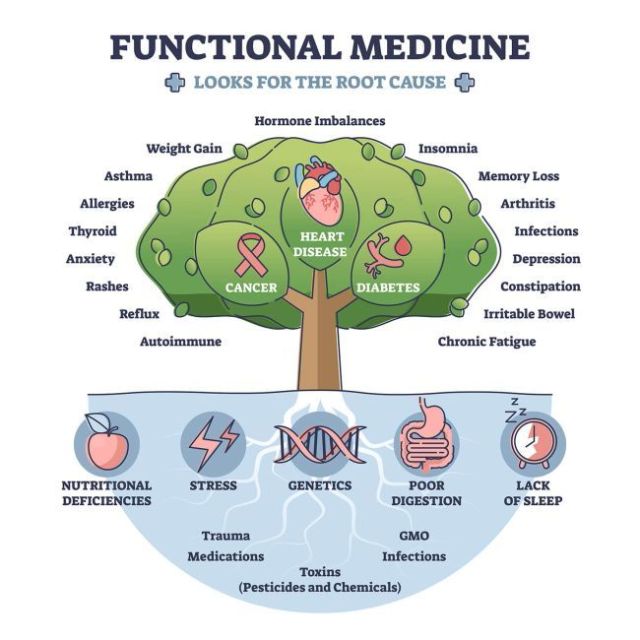Transform Your Health & Your Community
Rising healthcare costs place a heavy burden on families, but investing in your physical and mental wellbeing today can help you protect your future and feel your best.
At Functional Pharmacy, we’ve created two transformative courses designed to make high-quality care more affordable, accessible, and impactful:


the Root Cause Collective
Build lifelong habits that fuel your energy, strengthen your body, and prevent chronic disease. With expert guidance and small group support, you will learn to:
-
Focus on root causes, not just symptoms
-
Apply systems biology for whole-body wellness
-
Put personalized lifestyle strategies into action
-
Every session blends science with practical, everyday steps to help you feel vibrant, resilient, and in control of your health

the cognition Crusaders
Designed for individuals in the early stages of dementia and their care partners, this course offers a compassionate, structured pathway using the Bredesen Protocol™. In a safe, confidential, and supportive group, you’ll:
- Learn how functional medicine applies to dementia
-
Take weekly action steps that build on each other
-
Gain emotional and social support alongside peers
-
Feel empowered to naviagte this journey with strength and hope
CLICK ON WHAT YOU WANT TO IMPROVE...

WANT EVEN BETTER RESULTS?
The right support and tools can be an invaluable way of speeding up your health savings and improving your overall happiness.

With Functional Pharmacy, you don't just get strategies - you get guidance, community, and heart every step of the way. Start making healthy choices today, feel amazing tomorrow , and save big in the long run. Your best self - and your family's future - begin here.
Questions You May Be Wondering
Functional medicine is a personalized, systems-based approach to healthcare that focuses on identifying and addressing the root causes of disease. It’s grounded in the principles of systems biology, which means it views the body as an interconnected web of systems that influence one another dynamically. This approach emphasizes the biochemical individuality of each person, taking into account their unique genetic, environmental, and lifestyle factors to create tailored interventions aimed at restoring balance and optimizing health. It prioritizes a collaborative relationship between the patient and practitioner, focusing on the patient’s life story, lifestyle, and goals.
This contrasts with the more standardized, protocol-driven approach often seen in conventional medicine, which typically operates within a disease-centered model, focusing on diagnosing and treating specific diseases or symptoms, often using pharmaceuticals or surgical interventions. It’s highly effective for acute conditions, emergencies, and infections, where targeted treatments can save lives. However, it often falls short when addressing chronic, complex conditions like diabetes, autoimmune diseases, or cardiovascular issues, which are influenced by a multitude of factors over time.

While conventional medicine excels at acute care and symptom management, functional medicine shines in its ability to address chronic conditions by treating the person as a whole and focusing on the root causes of dysfunction. It’s not about replacing one with the other but integrating the strengths of both to create a more comprehensive model of care.
Basic lifestyle interventions in functional medicine are foundational steps aimed at restoring balance and optimizing health by addressing the root causes of dysfunction. These interventions are tailored to the individual, recognizing their unique genetic, environmental, and lifestyle factors. Let me break this down for you:
Dietary Adjustments:
Removing processed foods, trans fats, and potential allergens from the diet is a cornerstone. This includes focusing on whole, nutrient-dense foods, such as vegetables, moderate amounts of fruit, and healthy fats like omega-3 fatty acids. Organic and locally grown foods are preferred when possible to minimize exposure to pesticides and toxins. Incorporating a balance of macronutrients (proteins, fats, and carbohydrates) and ensuring adequate fiber and water intake are also emphasized.
Gut Health Optimization:
The gut is central to overall health, with 80% of the immune system clustered around the intestinal tract. Supporting gut health involves using prebiotics, probiotics, and dietary changes to restore a healthy microbiome and reduce inflammation. This can significantly impact immune function and detoxification processes.
Stress Management:
Chronic stress can dysregulate the hypothalamic-pituitary-adrenal (HPA) axis, leading to systemic inflammation and metabolic dysfunction. Techniques such as mindfulness, meditation, or other stress-reduction practices are encouraged to promote resilience and balance.
Physical Activity:
Exercise is tailored to the individual’s physical condition, focusing on moderate, consistent movement to support cardiovascular health, mitochondrial function, and overall vitality.
Toxin Reduction:
Eliminating toxic exposures from the environment, such as household pesticides, herbicides, and harmful cleaning products, is another key step. This reduces the burden on the body’s detoxification systems.
Adequate Rest and Recovery:
Prioritizing quality sleep and ensuring sufficient rest is critical for cellular repair, immune function, and overall well-being.
Patient Education and Support:
Functional medicine emphasizes patient-centered care, where individuals are educated about how their daily choices impact their health. This empowers them to take an active role in their wellness journey. Support is provided to help integrate these changes without overwhelming the individual.
These interventions are not about simply managing symptoms but rather about creating a foundation for long-term health by addressing the underlying causes of dysfunction. They are dynamic and adaptable, reflecting the unique needs of each person.
These three terms often get used together, but they mean different things along the spectrum from normal aging to Alzheimer’s disease. Here’s a clear breakdown:
SCI (Subjective Cognitive Impairment)
What it means:
A person notices problems with memory or thinking, but when tested, their scores are still in the normal range for their age.
Examples:
Misplacing things more often, feeling like names or words are harder to recall, needing more effort to concentrate.
Testing:
No objective evidence of impairment on cognitive testing.
Daily life:
No impact on independence.
Important note:
SCI can be a “warning stage,” as some people with SCI later develop MCI or dementia, but not everyone does.
MCI (Mild Cognitive Impairment)
What it means:
A step beyond SCI. There is measurable evidence of memory or thinking problems on testing, greater than expected for normal aging.
Examples:
Forgetting important appointments, repeating questions, taking longer to make decisions, trouble following conversations.
Testing:
Cognitive tests show mild deficits, usually in memory, attention, or language.
Daily life:
Person remains independent in everyday activities (cooking, finances, self-care), though tasks may take longer or need compensatory strategies (notes, reminders).
Progression:
About 10–15% of people with MCI progress to Alzheimer’s each year, though some remain stable or even improve.
Mild Alzheimer’s Disease (Early Dementia Stage)
What it means:
Memory and thinking problems are significant enough to interfere with daily life and independence.
Examples:
Frequently forgetting recent events, difficulty managing finances or medications, repeating the same stories, getting lost in familiar places, personality or mood changes.
Testing:
Clear evidence of impairment across multiple cognitive domains.
Daily life:
Independence starts to be compromised. The person may still live at home but often needs help with complex tasks (bill paying, driving, cooking).
Medical diagnosis:
At this stage, doctors can confidently diagnose Alzheimer’s dementia (mild stage).
THE
BOTTOM LINE:
SCI: "I feel my memory is slipping" — but tests are normal, and daily function is fine.
MCI: "My memory is measurably worse than normal aging" — but daily independence is intact.
Mild Alzheimer's: "My memory/thinking problems are interfering with daily life" — dementia is present.
In short, we learned that we don't want to wait until MCI or dementia. We want to treat at the prevention and SCI stages if we can. If someone is already in the MCI or dementia stage, following the protocol within the family’s wishes, is a compassionate choice for getting the best chance at positive outcomes seen so far. Generally, the more effort one puts into closely the protocol and the more support from family, coaches and practitioners, the better the results. Here is a summary of Dr. Dale Bredesen's experience so far:
People who have no cognitive impairment, truly no symptoms, and started PreCODE have not gone on to dementia. There has not been one documented case so far.
And virtually all people who were just experiencing subjective cognitive decline and started ReCODE, if they were doing the basics to address their root causes, like infections and toxins, all improved and stay improved.
People already experiencing mild cognitive decline have a more difficult time regaining lost ground. Drs. Ann Hathaway and Deborah Gordon co-authored a 2022 study on 25 patients with mild cognitive impairment and early Alzheimer's disease. After nine months of implementing the Bredeson Protocol (TM), 84% of the trial patients' cognition improved, with some having their cognitive scores increase from the dementia range to normal. Some improved a lot, some a little, but as a group, the marked improvement was not as significant as for those following the protocol with SCI.
And for those who started the protocol for someone already with dementia, he has seen fair results. Some with MoCA scores of zero become continent again. Others can recognize their families again. But those with dementia don't come back to perfect.
Training your body to smoothly move in and out of ketosis can be a powerful way to lower your risk of diabetes and achieve a healthy weight. The key is a plan tailored to you—with the right macronutrient balance, safe fasting windows, nourishing foods, quality sleep, movement, and stress management.
Because everyone’s needs are different, we recommend our one-on-one nutrition and lifestyle coaching package. You’ll get a personalized roadmap and expert support every step of the way to help you reach your goals safely and effectively.
If you’re 35 or older and ready to put a little time back into yourself, our monthly group meet-ups are here for you. In a relaxed, supportive space, you’ll discover simple ways to feel healthier, get moving again, and boost your energy. It’s especially great if you’re balancing kids, parents, and a career—and just want an easy, uplifting way to look and feel your best.
Whether you’ve been recently diagnosed with dementia, care for someone who has, or carry a higher genetic risk, you don’t have to face it alone. Our monthly gatherings combine expert guidance from a clinical pharmacist with an easy, step-by-step plan focused on nutrition, lifestyle, and brain health.
This welcoming group is especially valuable for caregivers—who face higher stress and a greater risk of cognitive decline themselves—and for those with APOE4 genetics who want to take action now. Together, you’ll learn the latest science-based strategies to protect your brain, lower your risk, and stay on the path to long-term wellness.



